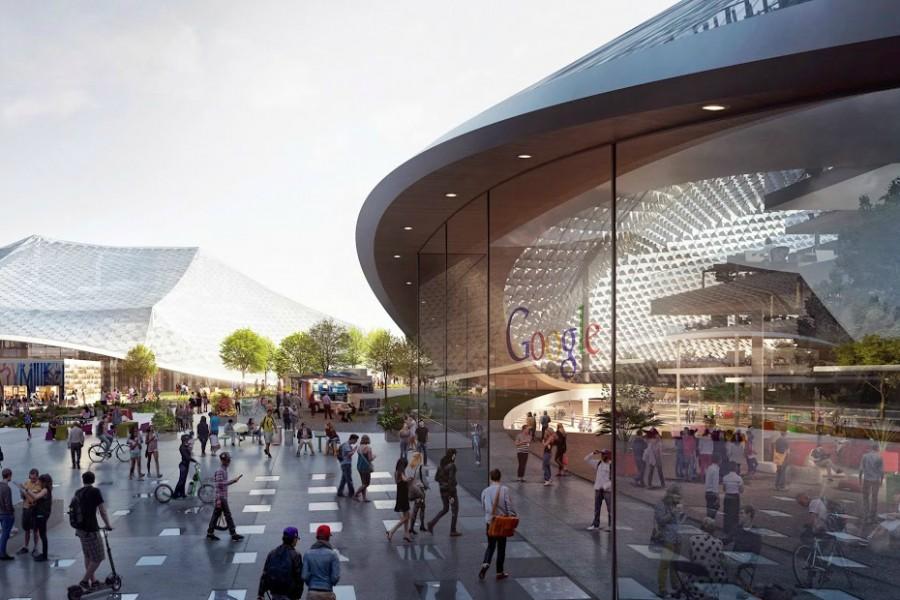LinkedIn Pushes on with North Bayshore Project
In October, professional-networking site LinkedIn unveiled details on plans to develop a tract of North Bayshore land near Shoreline Amphitheater, which it acquired rights to earlier this year. The project, called Shoreline Commons, aims to expand LinkedIn’s presence in Mountain View and to establish the company as a fixture in Silicon Valley.
The Mountain View City Council approved the project in May, granting LinkedIn 1.5 million square feet of office space or roughly three quarters of the entire North Bayshore parcel. However, the council voted 4-3 against a concurrent proposal for expansion from Google, awarding the company 500,000 square feet to build one of its four originally planned buildings.
Mountain View City Councilmember and former Mountain View mayor Michael Kasperzak, Jr., attributes Google’s dominating presence in Mountain View as a factor in the council’s decision to branch out.
“It’s important to the city to have more than one company,” Kasperzak said. “And even though [LinkedIn is] far, far smaller than Google, having economic diversity is really important.”
LinkedIn currently rents about 400,000 square feet of office space in North Bayshore. With plans for the first 1 million square feet of office space slated for completion by 2020 and the rest by 2023, LinkedIn expects to be able to accommodate an additional 7,500 workers by the time all of its offices are finished.
As part of the proposal, LinkedIn will address a variety of problems in anticipation of its increased workforce presence in Mountain View.
One of these issues is housing — according to the San Jose Mercury News, average monthly rents in Mountain View have increased by 53 percent in the last four years largely because builders have been unable to meet supply demands. In discussions with the Mountain View City Council, LinkedIn offered to pay developer MidPen Housing $40 million to construct 400 units in Mountain View, a figure significantly less than the five to ten thousand units that Kasperzak believes are needed to make an impact on housing prices.
“The whole Bay Area is in a housing crisis, not just Mountain View,” Kasperzak said. “People say that to have an impact on the rents, people would have to build five to ten thousand units in Mountain View to have a significant enough impact on the supply side to have any impact on pricing.”
LinkedIn must also address increased traffic and transportation issues as a result of the expansion. In order to reduce car traffic in the North Bayshore area, the city hopes to obtain more than $96 million from companies such as Google and LinkedIn for transportation upgrades, including new bike and pedestrian paths. So far, LinkedIn has committed to building a new bike and pedestrian bridge over Highway 101 that would connect the community living south of the highway to North Bayshore. In addition, LinkedIn has pledged roadway improvements to Shoreline Boulevard, although the impact of both projects on traffic is unclear.
However, several issues have impeded cooperation between Google and LinkedIn on issues of transportation infrastructure.
“There have been some letters back and forth that say, ‘Well we don’t plan to develop this, or we’re not going to do this according to LinkedIn’s plan,’” Kasperzak said.
For example, LinkedIn’s plans to develop new roadways have met with resistance from Google, who owns part of the property that the roads are on.
“There’s been posturing between the players out there,” Kasperzak said. “But it is in everybody’s interest to accommodate, to do what they need to do to reduce the traffic, or nobody gets to do what they want to do. Ultimately the city’s going to say, ‘If you guys don’t figure this out, we’re not issuing any building permits, so figure it out.’”
All parties are also discussing congestion on Shoreline Boulevard and Highway 101. The city expects that development in North Bayshore will cause 10,000 vehicle trips over the daily limit on the roads, which could halt any new building permits, including those of LinkedIn’s and Google’s, from being issued. As such, cooperation between the two companies is necessary if any future progress is to be made.
“This is not something that’s going to be accomplished by either just LinkedIn doing it or just Google doing it,” LinkedIn’s vice president of global workplace services Jim Morgensen said. “Or anyone else for that matter. This is something we’re going to have to come together and make a solution to, together.”



